-
ORIGINAL ARTICLE11-22-2024
Transitions experienced by people living with limitations resulting from leprosy: a research-care study
Revista Brasileira de Enfermagem. 2024;77(5):e20230229
Abstract
ORIGINAL ARTICLETransitions experienced by people living with limitations resulting from leprosy: a research-care study
Revista Brasileira de Enfermagem. 2024;77(5):e20230229
DOI 10.1590/0034-7167-2023-0229
Views0See moreABSTRACT
Objective:
to understand the transitional processes that affect the adaptation of people who live with limitations resulting from leprosy.
Methods:
This is a qualitative study based on the precepts of Transition Theory, mediated by care-research, with 24 people with limitations resulting from leprosy in an ex-hospital colony in Piauí. Semi-structured interviews were carried out. The interviews were analyzed using Iramuteq software.
Results:
the researched-caregivers experienced the four types of transitions, including feelings of fear, worry, loneliness, hopelessness, guilt and a tendency to hide the diagnosis. Breakdowns and resignation were revealed, with spirituality, adaptation to the new life situation and acceptance as facilitating conditions for coping with the transitional process, with a consequent improvement in quality of life.
Final considerations:
the transitional processes had a positive significance, since they contributed to adaptation and the achievement of quality of life.
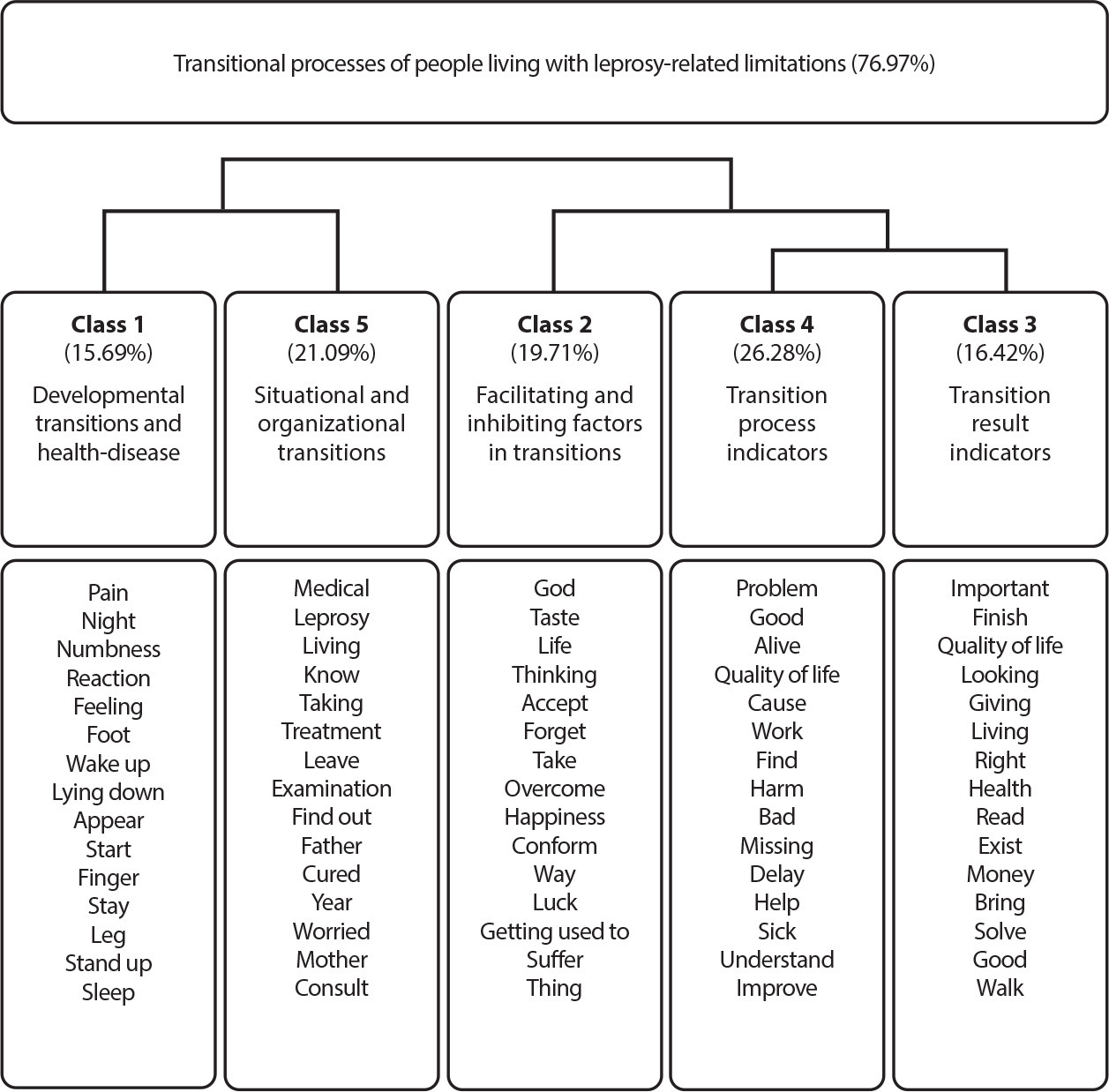
-
11-22-2024
Percepções de pessoas com deficiência física sobre acessibilidade e condições sociais: intervenções para enfermagem de reabilitação
Revista Brasileira de Enfermagem. 2024;77(5):e20240005
Abstract
Percepções de pessoas com deficiência física sobre acessibilidade e condições sociais: intervenções para enfermagem de reabilitação
Revista Brasileira de Enfermagem. 2024;77(5):e20240005
DOI 10.1590/0034-7167-2024-0005
Views0See moreRESUMEN
Objetivos:
analizar las experiencias de personas con discapacidad física adquirida en cuanto a accesibilidad y condiciones sociales; identificar intervenciones de rehabilitación dirigidas por enfermeras para la accesibilidad y condiciones sociales; determinar indicadores sensibles a la enfermería para mejorar la accesibilidad y condiciones sociales.
Métodos:
estudio cualitativo descriptivo-exploratorio utilizó entrevistas semiestructuradas con personas con discapacidad física adquirida mediante muestreo intencionado en bola de nieve para cumplir con todos los objetivos. El análisis de datos siguió los principios del análisis de contenido de Bardin. Los objetivos 2 y 3 se lograron mediante un enfoque teórico reflexivo.
Resultados:
los 27 participantes informaron desafíos de accesibilidad, que impactan las actividades de la vida diaria y las condiciones sociales. Esto influye en la enfermería de rehabilitación, dando lugar a tres campos de intervención: Evaluar la capacidad para realizar actividades diarias y los factores que influyen; Desarrollar e implementar capacitación para la realización de actividades diarias; Promover la movilidad, la accesibilidad y la participación social.
Consideraciones Finales:
a partir de las experiencias de los participantes, identificamos intervenciones de rehabilitación dirigidas por enfermeras para promover la accesibilidad y condiciones sociales.
-
ORIGINAL ARTICLE11-22-2024
Sociodemographic and occupational influences on health professionals’ quality of life
Revista Brasileira de Enfermagem. 2024;77(4):e20240010
Abstract
ORIGINAL ARTICLESociodemographic and occupational influences on health professionals’ quality of life
Revista Brasileira de Enfermagem. 2024;77(4):e20240010
DOI 10.1590/0034-7167-2024-0010
Views0See moreABSTRACT
Objective:
To analyze the sociodemographic and occupational influences on health professionals’ quality of life.
Method:
This descriptive-exploratory, cross-sectional, analytical, and quantitative study addressed 94 health workers, including nursing technicians, nurses, and physical therapists working in Intensive Care Units in a town in the extreme south of Brazil in 2023. The student’s t-test and Spearman correlation were used.
Results:
A significant positive correlation was found between being a woman and the psychological domain and between income and the social and environmental domain while working hours were inversely related to general QoL. Additionally, workload negatively impacted the physical, psychological, and general QOL, furniture negatively influenced the psychological domain, and equipment was negatively associated with the physical and psychological domain.
Conclusion:
The characteristics of the work environment interfere with several areas of quality of life.
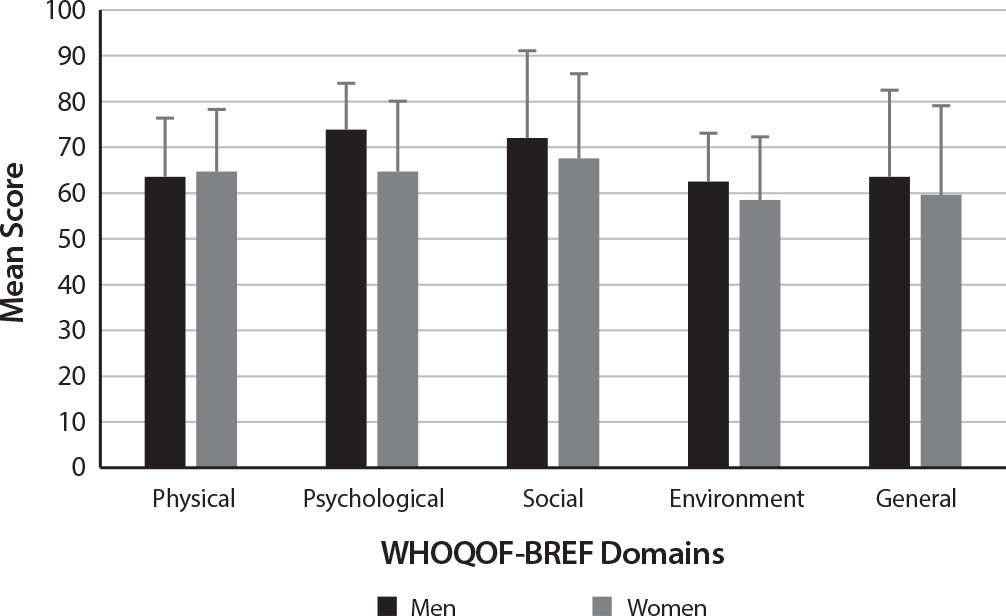
-
REVIEW11-22-2024
Concept analysis of youth: understanding the plurality of subjects
Revista Brasileira de Enfermagem. 2024;77(4):e20240002
Abstract
REVIEWConcept analysis of youth: understanding the plurality of subjects
Revista Brasileira de Enfermagem. 2024;77(4):e20240002
DOI 10.1590/0034-7167-2024-0002
Views0See moreABSTRACT
Objective:
To analyze the concept of “youth.”
Methods:
This is a concept analysis guided by the method proposed by Walker and Avant, operationalized through an integrative literature review. The search in scientific databases was carried out using the descriptors: youth; young; adolescence. To compose the literary corpus, 22 studies were selected.
Results:
Various factors were found in the antecedents that influence the separation of youth groups, contributing to the heterogenization of this population. The attributes include characteristics that comprise the formation of youth groups, especially the idea of shared experiences and social construction, as well as the consequences of the mentioned concept. After systematizing the variables, the analysis was conducted, highlighting the conceptions that influence youth.
Conclusion:
The study demonstrated the multifactorial complexity of the formulation of the concept of youth, highlighting various factors that contribute to this construction. For nursing, this conceptual field allows for an understanding of the population and effective engagement with this group.
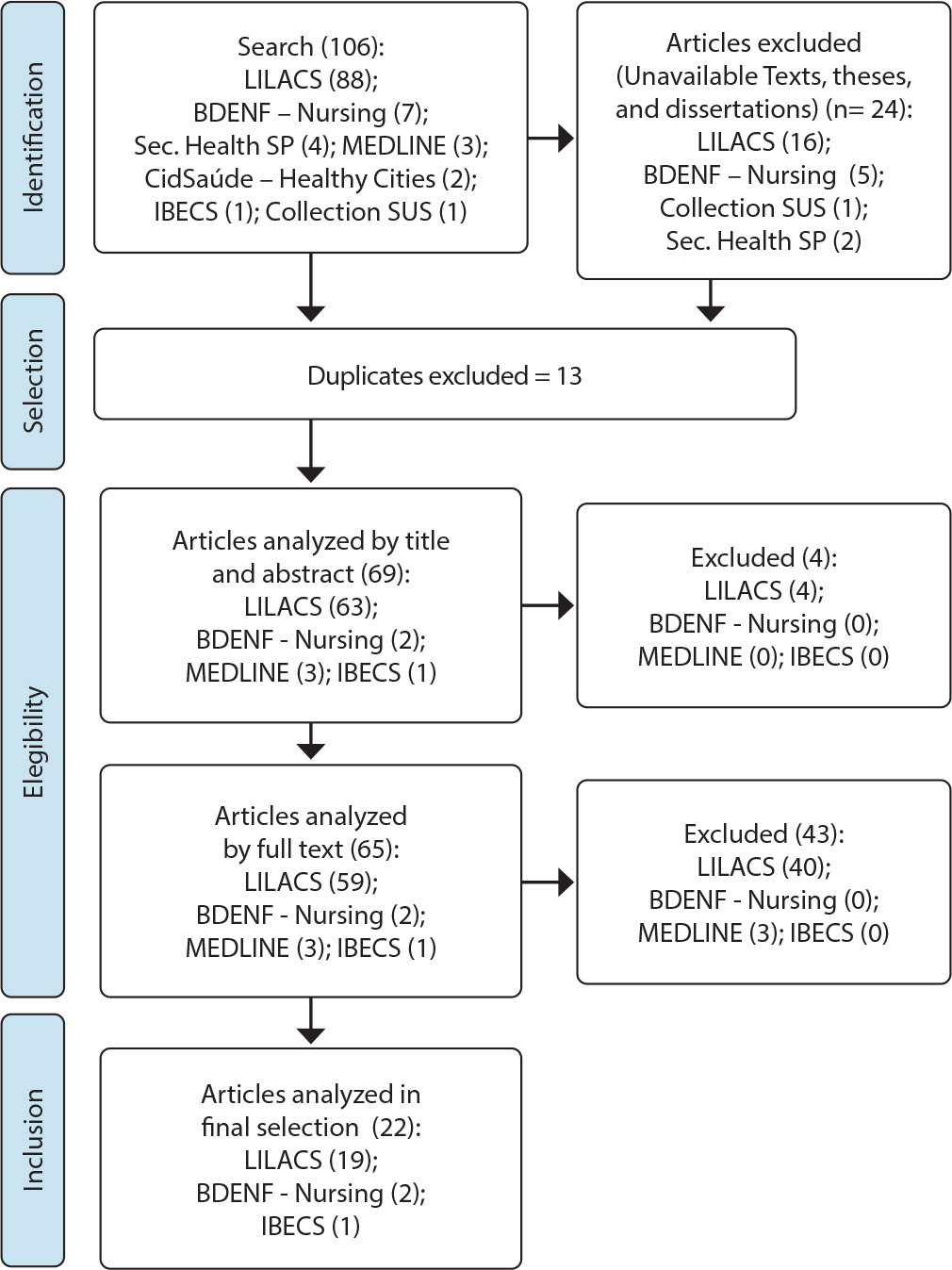
-
ORIGINAL ARTICLE11-22-2024
Temporal trends in neonatal mortality in Pernambuco
Revista Brasileira de Enfermagem. 2024;77(4):e20230451
Abstract
ORIGINAL ARTICLETemporal trends in neonatal mortality in Pernambuco
Revista Brasileira de Enfermagem. 2024;77(4):e20230451
DOI 10.1590/0034-7167-2023-0451
Views0See moreABSTRACT
Objective:
To verify the temporal trend of neonatal mortality in the health regions of Pernambuco between 2000 and 2020.
Method:
A time-series ecological study was conducted, analyzing the total neonatal mortality rate and its early and late components. For regression analysis, Joinpoint Regression was applied, trends were classified, and annual and average percentage changes were calculated for the period, with a significance level of 95%.
Results:
The average neonatal mortality rate in Pernambuco was 11.5 during the studied period. A decreasing trend in neonatal mortality rate was observed, especially in the early component. The region where the state capital is located showed the fastest decrease across all components.
Conclusion:
The temporal trend of neonatal mortality was decreasing; however, the rate of reduction was not uniform across the health regions of the state, and the implementation of the Mãe Coruja Pernambucana Program did not impact the trend in neonatal mortality.
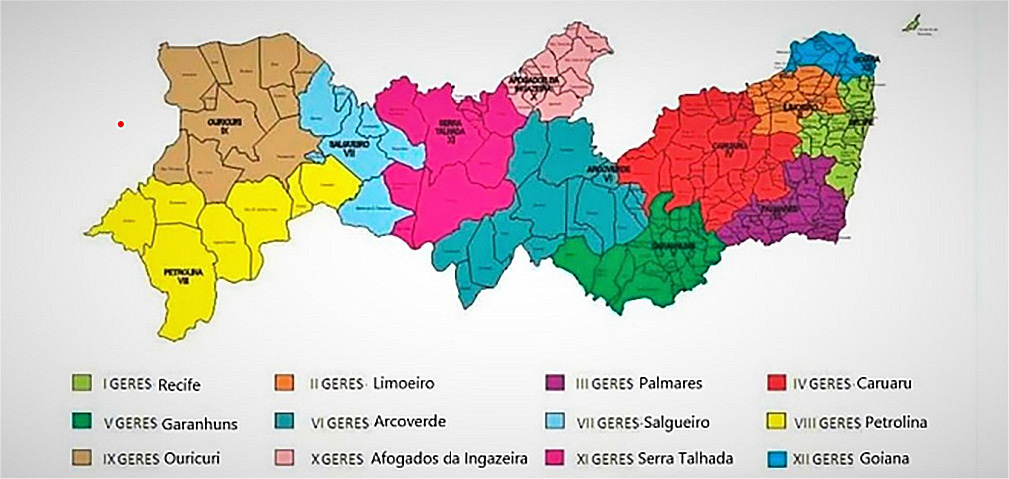
-
ORIGINAL ARTICLE11-22-2024
Evaluation of a video to promote HIV testing in sexual minorities
Revista Brasileira de Enfermagem. 2024;77(4):e20230320
Abstract
ORIGINAL ARTICLEEvaluation of a video to promote HIV testing in sexual minorities
Revista Brasileira de Enfermagem. 2024;77(4):e20230320
DOI 10.1590/0034-7167-2023-0320
Views0See moreABSTRACT
Objective:
To design and evaluate an educational video aimed at promoting HIV testing in gay men from the theoretical perspective of the Nola J. Pender Health Promotion Model.
Methods:
The design comprised five steps: 1.- Literature search; 2.- Formulation of the educational objective; 3.- Drafting of the script and location of the information in the theoretical components; 4.- Production; and 5.- Evaluation by experts and the target population.
Results:
The video “Living Without Fear” was produced, which presents the dilemma faced by gay men before taking a HIV test. The content validity index was 0.85, which indicated that the information was adequate and acceptable for promoting the rapid HIV test.
Final Considerations:
The results contribute to the scientific evidence aimed at promoting healthy behavior. In addition, the video was shown to be an acceptable educational tool.
-
ORIGINAL ARTICLE11-22-2024
Development and validity of a mobile application prototype for hospital shift handover
Revista Brasileira de Enfermagem. 2024;77(4):e20230173
Abstract
ORIGINAL ARTICLEDevelopment and validity of a mobile application prototype for hospital shift handover
Revista Brasileira de Enfermagem. 2024;77(4):e20230173
DOI 10.1590/0034-7167-2023-0173
Views0See moreABSTRACT
Objective:
To develop and validate a mobile application prototype for nursing shift handover in a hospital inpatient unit.
Methods:
A methodological study of technological production, carried out from April 2020 to January 2022, for mobile application construction and validity through the Design Thinking methodology. The study involved the stages of prototype development and validity by experts.
Results:
The application for mobile nursing shift handover obtained a usability score of 79 points and a content validity coefficient of 0.7.
Conclusions:
The instrument obtained an excellent assessment according to usability and agreement among experts. However, future studies are needed to implement this technology in order to assess effectiveness, time optimization and failures during communication.
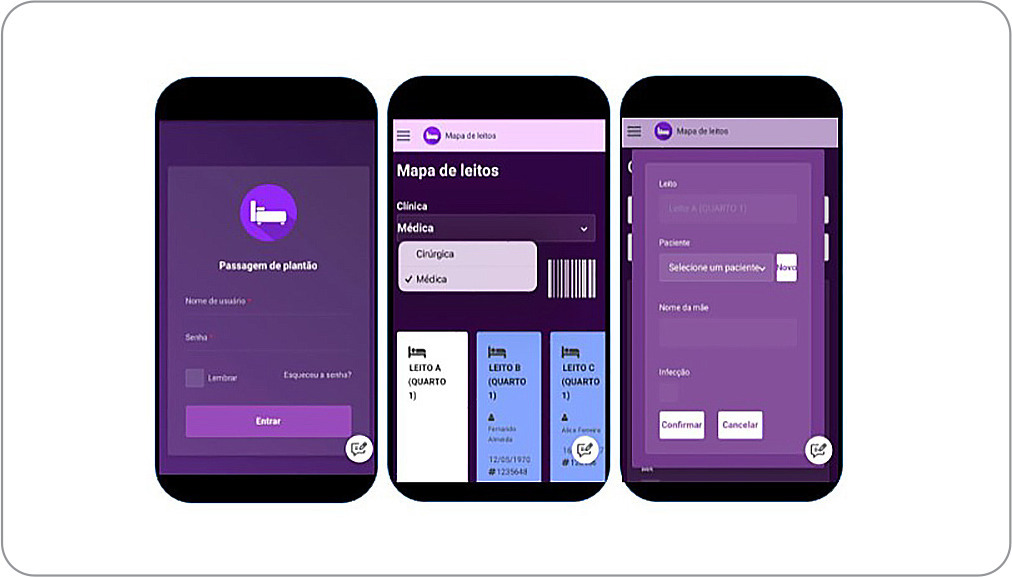
-
ORIGINAL ARTICLE10-25-2024
Analysis of the vaccination situation against Mpox in people living with HIV/AIDS: an ecological study
Revista Brasileira de Enfermagem. 2024;77(5):e20230234
Abstract
ORIGINAL ARTICLEAnalysis of the vaccination situation against Mpox in people living with HIV/AIDS: an ecological study
Revista Brasileira de Enfermagem. 2024;77(5):e20230234
DOI 10.1590/0034-7167-2023-0234
Views0See moreABSTRACT
Objectives:
to analyze the vaccination situation against Mpox in people living with HIV/AIDS in Brazil.
Methods:
an ecological study on the vaccination status against Mpox in people living with HIV/AIDS (PLWHA) in Brazil. The data were collected in April 2023 through information from the Ministry of Health, using the “Microsoft app Power BI,” which is publicly accessible.
Results:
the data analysis revealed that in Brazil, 2,978 doses of the MVA-BN Jynneos Mpox vaccine were administered in PLWHA, resulting in a vaccination coverage of 18.3%, with the southern and southeastern regions showing the lowest and highest vaccination coverage, respectively. Gender-based evaluation showed a higher proportion of vaccinated males.
Conclusions:
we identified low vaccination coverage in all regions of Brazil, highlighting the need for intensified vaccination activities, especially for PLWHA.
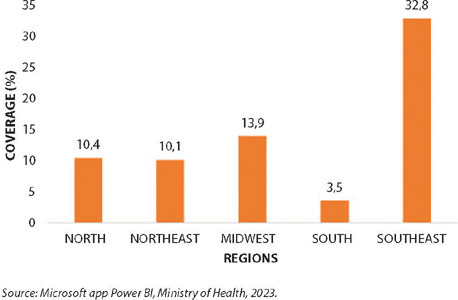
-
REVIEW12-21-2020
Strategies and competences of nurses in men’s health care: an integrative review
Revista Brasileira de Enfermagem. 2020;73:e20190546
Abstract
REVIEWStrategies and competences of nurses in men’s health care: an integrative review
Revista Brasileira de Enfermagem. 2020;73:e20190546
DOI 10.1590/0034-7167-2019-0546
Views0See moreABSTRACT
Objectives:
to synthesize scientific evidence on nurses’ strategies and competencies in men’s health care.
Methods:
an integrative review carried out in seven databases, with a time frame from 2009 to 2019, using the descriptors “men’s health”, “professional competence”, “nursing”, “nursing care” and “male” in Portuguese and in English.
Results:
ten articles were selected, in which it was demonstrated that nursing professionals develop their professional practices with regard to men’s health care, in convergence with the general skills of the profession. The most used are health care; decision-making; Communication; administration; management; continuing education and leadership, consecutively.
Final Considerations:
professionals’ efforts to strengthen health actions, aimed at male needs, in accordance with the general skills of the profession and the principles and guidelines of the Brazilian National Policy for Comprehensive Care to Men’s Health.

-
ORIGINAL ARTICLE12-04-2020
“The pen is the blade, my skin the paper”: risk factors for self-injury in adolescents
Revista Brasileira de Enfermagem. 2020;73:e20200578
Abstract
ORIGINAL ARTICLE“The pen is the blade, my skin the paper”: risk factors for self-injury in adolescents
Revista Brasileira de Enfermagem. 2020;73:e20200578
DOI 10.1590/0034-7167-2020-0578
Views0See moreABSTRACT
Objective:
to describe the risk factors that influence the self-injury behavior of adolescents assisted at a Psychosocial Care Center for Children and Adolescents, according to subjects’ own perceptions.
Method:
a descriptive, exploratory, qualitative study carried out through medical records and a focus group with 07 adolescents. The statements were submitted to thematic content analysis.
Results:
in the risk factors category, four subcategories emerged: Family adversity factors; Social contagion; Adverse life events; Personal characteristics. Conflicts, lack of support, drug use in the family, meeting someone who cuts themselves, social networks, religiosity, history of sexual violence and bullying were identified as risk factors that influence self-injury.
Final Considerations:
adolescents pointed out the need for prejudice-free dialogues in schools, in health and family devices, configuring protective factors to avoid this practice that comes from several negative events throughout life.

-
REVIEW11-25-2020
Auriculotherapy and reducing chronic musculoskeletal pain: integrative review
Revista Brasileira de Enfermagem. 2020;73:e20190394
Abstract
REVIEWAuriculotherapy and reducing chronic musculoskeletal pain: integrative review
Revista Brasileira de Enfermagem. 2020;73:e20190394
DOI 10.1590/0034-7167-2019-0394
Views0See moreABSTRACT
Objectives:
to describe the scientific evidence on the use of auriculotherapy to reduce chronic musculoskeletal pain in adults and the elderly.
Methods:
integrative literature review conducted in the Latin American and Caribbean Health Sciences, SciVerse Scopus and MEDLINE databases (via National Library of Medicine), in March 2019, with no time frame.
Results:
14 original scientific articles were analyzed, 64.3% of which were classified with level of evidence 2. All productions show the benefit of auriculotherapy in reducing chronic musculoskeletal pain, especially in the lumbar spine (42.9%). The treatment was developed in one or more sessions, using semi-permanent needles (42.9%) and electro-auriculotherapy (21.4%).
Conclusions:
auriculotherapy was effective in reducing chronic musculoskeletal pain, showing itself as an alternative to be used for the promotion and recovery of individuals’ health.

-
REVIEW09-18-2020
Allocation of resources for health care in COVID-19 pandemic times: integrative review
Revista Brasileira de Enfermagem. 2020;73:e20200244
Abstract
REVIEWAllocation of resources for health care in COVID-19 pandemic times: integrative review
Revista Brasileira de Enfermagem. 2020;73:e20200244
DOI 10.1590/0034-7167-2020-0244
Views0See moreABSTRACT
Objective:
To analyze information on resource allocation in the context of the COVID-19 pandemic, published in indexed scientific journals, from December 2019 to March 2020.
Methods:
This is an integrative literature review, which took place in March 2020. All databases were investigated and studies were found only in MEDLINE. After applying the established criteria, six articles were selected.
Results:
It was evident that the allocation of resources is carried out as the demands emerge. The fragility in presenting scientific-methodological evidence that can guide decision makers for assertive allocation of available resources is highlighted. The results showed that studies on this subject are incipient and need to be expanded.
Final considerations:
The need for health organizations and area authorities to be better prepared for the proper use of available resources, with allocation based on scientific evidence and maximization of resources is indicated.

-
REFLECTION07-10-2020
In defense of the Unified Health System in the context of SARS-CoV-2 pandemic
Revista Brasileira de Enfermagem. 2020;73:e20200247
Abstract
REFLECTIONIn defense of the Unified Health System in the context of SARS-CoV-2 pandemic
Revista Brasileira de Enfermagem. 2020;73:e20200247
DOI 10.1590/0034-7167-2020-0247
Views0See moreABSTRACT
Objective:
To discuss the political and structural conditions for establishing the Unified Health System (UHS – Sistema Único de Saúde, SUS) in coping with the SARS-CoV-2 pandemic.
Methods:
Theoretical-reflection study.
Results:
At the first moment named “The global and the local in facing the SARS-CoV-2 pandemic” is presented the health crisis that took place worldwide and the government actions to combat COVID-19. A second moment named “Between dismantling actions and resistance, the UHS is the best way to face the SARS-CoV-2 pandemic”, reflects on the neoliberal attacks on the health system and how it resists, remaining the main pandemic response strategy.
Conclusion:
The strengthening of democracy and the defense of the UHS are the way out of the crisis. It is believed that this reflection generates – in everyone who deals with caretaking – the political action, the ethical attitude, the desire for valorization and the spirit of struggle in defense of the UHS and human life.
-
REVIEW05-28-2021
Scientific production about palliative care and communication in online journals: a scoping review
Revista Brasileira de Enfermagem. 2021;74(2):e20190378
Abstract
REVIEWScientific production about palliative care and communication in online journals: a scoping review
Revista Brasileira de Enfermagem. 2021;74(2):e20190378
DOI 10.1590/0034-7167-2019-0378
Views0See moreABSTRACT
Objectives:
to characterize publications about palliative care and communication, with an emphasis on the approaches addressed, disseminated in online journals.
Methods:
it is a scope review, in which the mnemonic strategy Problem, Concept and Context was used, based on database research. The sample consisted of 86 publications.
Results:
most publications were written in the English language, published in the journal BMC Palliative Care, and with level of evidence IV. As for the approaches approached, the following stand out: Importance of communication in palliative care; Breaking the bad news in palliative care; Training professionals/staff to communicate in palliative care; and Communication strategies in palliative care.
Final Considerations:
the review made it possible to map a significant number of publications on palliative care and communication. It is recommended to produce new studies with better scientific evidence that guide the assistance of health professionals.
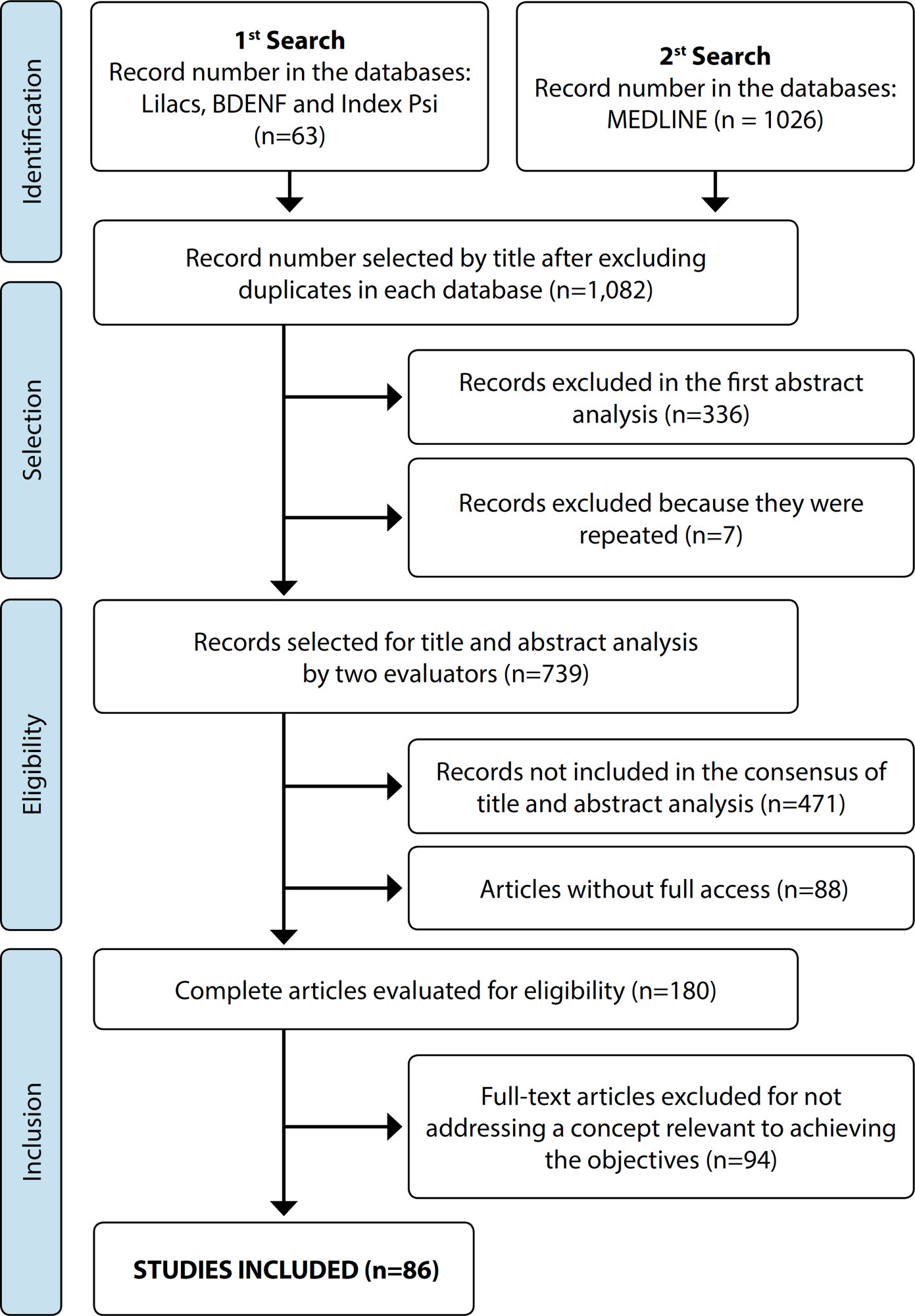
-
ORIGINAL ARTICLE12-13-2019
Quality of life in the climacteric of nurses working in primary care
Revista Brasileira de Enfermagem. 2019;72:154-161
Abstract
ORIGINAL ARTICLEQuality of life in the climacteric of nurses working in primary care
Revista Brasileira de Enfermagem. 2019;72:154-161
DOI 10.1590/0034-7167-2018-0306
Views0See moreABSTRACT
Objective:
to evaluate the quality of life of primary care nurses in the climacteric.
Method:
A cross-sectional descriptive-analytic study, performed with 98 female nurses, aged 40-65 years, using the WHOQOL-Bref questionnaire.
Results:
the worst level of quality of life was observed for professionals aged 50-59 years, non-white, specialists, divorced or widowed, with children, a lower income, with another employment relationship, a weekly workload of more than 40 hours, who consumed alcoholic beverages weekly, with chronic disease, in continuous use of medications, sedentary, who did not menstruate and did not receive hormonal treatment, and who went through menopause between the ages of 43-47 years.
Conclusion:
Although the variables “physical activity” and “age” have a statistically significant association with quality of life, other variables seem to interfere in these professionals’ lives, indicating the need for a more critical and deep reflection on these relations.
-
ORIGINAL ARTICLE09-21-2020
Incontinence associated dermatitis in elderly people admitted to a university hospital
Revista Brasileira de Enfermagem. 2020;73:e20190374
Abstract
ORIGINAL ARTICLEIncontinence associated dermatitis in elderly people admitted to a university hospital
Revista Brasileira de Enfermagem. 2020;73:e20190374
DOI 10.1590/0034-7167-2019-0374
Views0See moreABSTRACT
Objective:
To identify the frequency and factors associated to incontinence associated dermatitis in elderly people.
Methods:
Cross-sectional study with 202 elderly patients admitted to a university hospital between September 2017 and January 2018. Data collection included: cognitive screening, sociodemographic and clinical questionnaire. It was performed exploratory and descriptive analysis, where prevalence and ratios (PR) were calculated.
Results:
Prevalence of injury was 9.4%, age range 70-79 years (13.5%), African American (21.4%), hospitalization period ≥ 21 days (44.4%), in use of nasogastric tube (33.3%), medical device (11.3%), restricted mobility (18.5%). It was associated with hospitalization period, use of nasogastric tube, restricted mobility, medical devices, and cognition.
Conclusion:
It was confirmed an average frequency of incontinence associated dermatitis in elderly patients and association to factors such as hospitalization period, immobility, cognition, use of nasogastric tube and devices. It must be highlighted the importance of prevention measures, early detection, assessment and monitoring of this type of injury.
Search
Search in:
Nuvem de Tags
Adolescente (85) Atenção Primária à Saúde (239) COVID-19 (91) Criança (91) Cuidados de Enfermagem (269) Educação em Enfermagem (151) Educação em Saúde (139) Enfermagem (930) Enfermagem Pediátrica (86) Estudantes de Enfermagem (77) Estudos de Validação (131) Família (87) Idoso (208) Promoção da Saúde (99) Qualidade de Vida (104) Saúde do Trabalhador (86) Saúde Mental (145) Saúde Pública (82) Segurança do Paciente (150) Tecnologia Educacional (100)



